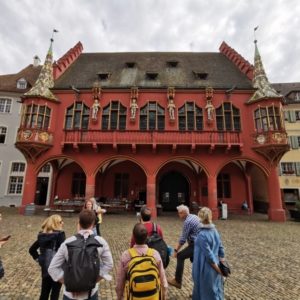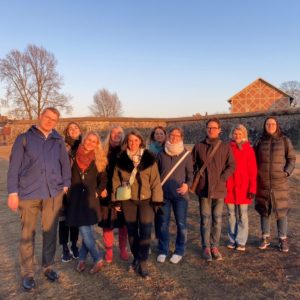Material
Autobiographical writing in contemporary French literature
Information
Title
Autobiographical writing in contemporary French literature: a dialogue between subject science and subject didacticsAuthors
Melanie Koch-FröhlichName of the institution
Albert-Ludwigs-Universität Freiburg, Pädagogische Hochschule (University of Education) FreiburgFormat
PDFKeywords
Autobiography, contemporary French literature, subject science, literary studies, subject didactics, foreign language didactics, content knowledge (CK), pedagogical content knowledge (PCK), tandem course, co-teachingTopic
Presentation of an Integrative Master’s tandem-seminar on autobiographical writing in contemporary French literatureGoals
Students’ learning goals:- to acquire/reactivate basic content knowledge (CK) and pedagogical content knowledge (PCK) from previous semesters/courses
- to establish interrelations between autobiographical theory and literature
- to identify, analyse and evaluate the cultural, social and didactical potential of selected autobiographical texts
- to perceive literature as “knowledge for living”
- to master close-reading (language, imagery, intertextuality, syntax and form)
- to justify decisions in scientific debate
- to demonstrate the ability to didactically reconstruct and transform the CK content for school-related teaching and learning contexts.
Domains/aspects of coherence
CK, PCKIntended OER user group
Teacher educators in modern languages, lecturers in TE interested in co-teaching, literary scholars, didacticians in modern languagesTarget group of the course (educational level and study year)
Student teachers in final phase of upper secondary Master of Education program (year 5) in FrenchContext information users would need to understand the OER (e.g. about the TE system, curricular integration)
The students are in the final phase of the five-year teacher training programme, which includes French and another school subject (2-subject programme). In each subject, they have completed at least 90 ECTS in subject-specific science and 12 ECTS in subject didactics as well as 36 ECTS in pedagogy and 20 ECTS in school practice (internship with accompanying courses). After completing their studies, they go through an induction phase of at least 1.5 years in school before they receive the full qualification as a teacher.Language of the example
License
CC-BY-4.0Download content sheet, material and raw files
Events: ConnEcTEd
Blog: ConnEcTEd
Es gibt derzeit noch keine Beiträge in dieser Kategorie.

Reisebericht: ConnEcTEd Project Meeting in Zagreb
Ein zentrales Anliegen der School of Education FACE ist die Entwicklung kohärenter – also strukturell und inhaltlich sinnhaft zusammenhängender – Curricula oder Module im Rahmen des Lehramtsstudiums. Was liegt da in Zeiten der Globalisierung näher, als sich anzusehen, wie dieses Prinzip in anderen Staaten und Bildungssystemen umgesetzt wird? Im Rahmen des Projekts ConnEcTEd geschieht genau das. Im September dieses Jahres reiste eine Freiburger Delegation nach Zagreb, um sich dort gemeinsam mit Projektpartner*innen aus Oslo, Nizza, Helsinki und Zagreb in Präsenz zu diesem wichtigen Thema auszutauschen.

Ins Bächle „dappen“, oder nicht? Treffen des ConnEcTEd-Teams in Freiburg
After the first in-person-meeting in March in Oslo, the ConnEcTED-Team met for the second time in Freiburg im Breisgau at the end of May. In the „Green City“ on the western edge of the Black Forest, right on the border to Switzerland and France, the project members reported on their work, discussed new tasks and further steps in the project, as well as forms of collaboration in different IOs.

Reisebericht: Das ConnEcTEd-Team in Oslo
Ein zentrales Anliegen der School of Education FACE ist die Entwicklung kohärenter – also strukturell und inhaltlich sinnhaft zusammenhängender – Curricula oder Module im Rahmen des Lehramtsstudiums. Was liegt da in Zeiten der Globalisierung näher, als sich anzusehen, wie dieses Prinzip in anderen Staaten und Bildungssystemen umgesetzt wird? Im Rahmen des Projekts ConnEcTEd geschieht genau das. Ende März dieses Jahres reiste eine Freiburger Delegation nach Oslo, um sich dort in Präsenz zu diesem wichtigen Thema auszutauschen.
Funding
This project receives funding from the Erasmus+ programme of the European Union (Strategic Partnerships, KA 203).
The contents of this website and the view expressed in the news and publications are the sole responsibility of the authors and under no circumstances can be regarded as reflecting the position of the European Union.




